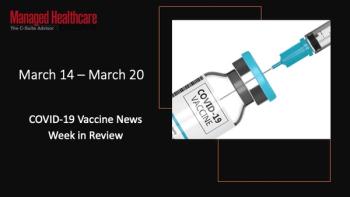
The agency also gave the green light to Zegalogue, an injectable treatment for severe hypoglycemia.

The agency also gave the green light to Zegalogue, an injectable treatment for severe hypoglycemia.

Study addresses how millennials are approaching their health and what significant medical appointments they should be making right now during the pandemic.

Study finds cancer screenings are increasing, however a "catch-up" to pre-COVID-19 baseline levels still requires prioritization of high-risk individuals to get deferred preventative care.

The healthcare system is facing an onslaught of patients with new and worsening conditions due the COVID-19 pandemic, but it is nowhere near ready to accommodate them.

A data monitoring committee stopped a trial early because of evidence of " profound efficacy," according to a press release issued by Vir Biotechnology and GlaxoSmithKline.

Amid the nursing shortage, hospitals can create better working conditions through these three technology solutions.

Medicine is both an art and a science. Some physicians would contend that science—specifically data science—has overtaken medicine and limited their ability to make decisions based on informed intuition and personal experience.

Founder and CEO of a leading care coordination technology company discusses the buzz about the new Direct Contracting Model.

How consumers feel about their virtual care encounters will influence everything from CAHPS surveys to compensation beyond the pandemic.


Americans are becoming more anxious to get the COVID-19 vaccine as additional vaccines are approved and doses are being distributed directly to United States retail pharmacies. According to NordVPN, Google searches in America for the vaccine are growing by 1,900% since January.

African Americans are significantly less likely to get a COVID-19 vaccination, and hesitancy is particularly prevalent in South Carolina and the Southeast U.S., a new survey says.

Managers can help by removing any stigma against seeking help and providing access to support groups and professional services.

The American Council of Life Insurers (ACLI) senior vice president of Policy Development, Paul Graham, recently responded to the social media news which suggested COVID-19 vaccines could be a factor a life insurer considers in the claims-paying process.

The opportunity for health insurers is to implement a well-designed cost estimator tool that goes beyond compliance to the new CMS rule and meets member and health insurer market trends by integrating more quality and cost metrics with an easy-to-use member interface.


COTA’s real-world data and Kite's drug development pipeline will complement single-arm clinical trials to accelerate cancer research benefiting patients.

MHE's Briana Contreras spoke with Dr. Ami Parekh, chief medical officer of Grand Rounds. Ami and Briana talked about the rise of the chief medical officer role, how businesses can benefit from it and what it means for the future of the C-suite. They also discussed how Ami's role as a CMO, and other C-Suite positions, evolved during the pandemic and why it is so essential for businesses to provide advice and clinical guidance to help best keep operations running safely.

The phase 2 TOPAZ trial demonstrated treatment is safe and improves motor function in patients with SMA.

Grand Rounds and Doctor On Demand merge to revolutionize how millions of Americans receive healthcare in a first of its kind patient-centric virtual care organization.

The pandemic has brought patient self-service to the fore.

Screening and some care have been canceled or deferred. Will more illness and deaths result?

Companies are working on a 2-drug regimen of Gilead's lenacapavir and Merck’s islatravir.


The State of Texas remains to recover from the winter storm blackout back in February. While the state still has much rebuilding and catching back up to do by covering damages and other economic losses, new operations among the state's and nation’s healthcare providers are coming out of it.

Multiple sclerosis (MS) is a chronic disease that involves demyelination of plaque throughout the white and gray matter of the central nervous system. The early stages of MS are usually marked by a relapsing-remitting course of neurological deficits, which progress toward continuous, permanent dysfunction and disability. Of those with a diagnosis of MS, 74% are women.

The efficiency and ease of tools that support virtualization will set the stage for the future of cancer care.

Patients with chronic conditions like asthma, diabetes, and cardiovascular disease often require emergency attention and hospitalization due to non-adherence, resulting in higher treatment costs.

Providers and payers need data to address social determinants of health effectively. But that data is often siloed, unstructured and difficult to use.

Devices take some of the pressure off a healthcare system coping with COVID-19.